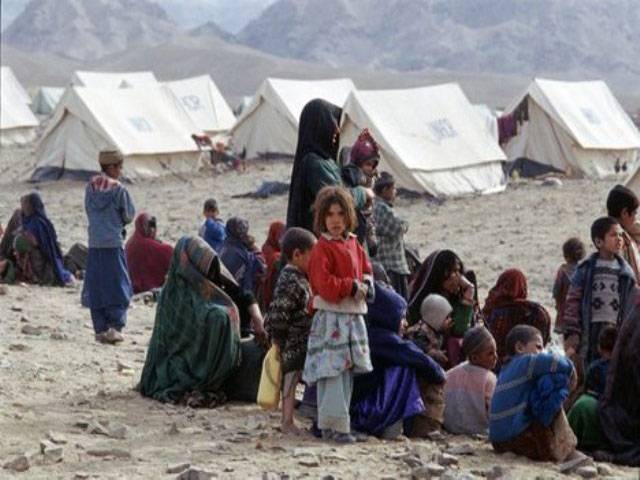ISLAMABAD - Pakistan yielded to United States and Afghanistan’s pressure yesterday to extend Afghan refugees’ stay for another six months as Islamabad worked to improve ties with Washington and the neighbouring Muslim nation, officials said.
The decision came partly because it was unfeasible to immediately force hundreds of thousands of refugees back into Afghanistan as their staying limit was going to end today (June 30).
The officials said Prime Minister Nawaz Sharif, who is recovering from a heart surgery in London, approved extension for Afghans’ stay in the country.
They said the PM wanted to bring a new policy to repatriate the refugees and the six months will give time to the government to complete its plan.
Afghan ambassador to Pakistan Omar Zakhilwal confirmed the stay extension, saying it will provide an opportunity for Pakistan and Afghanistan and other countries to negotiate the refugees’ repatriation in a dignified way.
Later a notification issued by the Ministry of States and Frontier Regions said, “The Prime Minister of Pakistan was pleased to approve the extension of Proof of Registration cards issued by National Database Regulatory Authority to registered Afghan refugees in Pakistan till 30th June 2016 which is near to expire.”
Imran Zeb Khan, the chief commissioner for Afghan Refugees, said, “Pakistan can’t ensure that these refugees will return. That cannot happen without support from Afghanistan and the international community which need to create the right conditions for their repatriation.”
Khan said Pakistan would hold a tripartite meeting with Afghanistan and the United Nations refugee agency on July 19 to plan the way forward.
Officials said the PM had also taken notice of Pakistan Tehrik-e-Insaf-led Khyber Pakhtunkhwa’s campaign against the refugees. The provincial government had opposed extending the refugees stay in the country. The Primer stopped the authorities from arresting or harassing the Afghan refugees until a new policy is formulated.
A senior official at the foreign ministry told The Nation, that the PM wanted to improve ties with Washington and Kabul through this decision.
“There was pressure from both Washington and Kabul to give more time for the repatriation of the Afghan refugees. Pakistan obliged both while sticking to its policy of ultimately sending them home. This action will please both the US and Afghanistan,” added the official.
He said the goodwill gesture from Pakistan could be a first step towards improvement in Pak-US relations that have touched the lowest ebb in the last weeks.
Earlier, the UN refugee agency increased assistance package for registered Afghan refugee families, who were opting to return to Afghanistan under the UNHCR-facilitated voluntary return program.
The UN High Commissioner for Refugees Filippo Grandi made the announcement as he concluded his first tri-nation visit to Afghanistan, Iran and Pakistan, a UNHCR statement said.
“As an immediate step, he announced to double the existing individual assistance package for returnees from an average of $200 to $400 per person,” it added.
The High Commissioner reassured the Pakistani leadership of UNHCR's continued support in assisting the 1.5 million Afghan refugees currently residing in the country.
Afghan officials say they had requested Pakistan to extend the Proof of Registration Cards, or PoR cards, for two more years so they are able to make arrangements to accommodate the returnees.
Besides the registered ones, Pakistan also hosts about one million unregistered Afghan refugees, and Pakistan and Afghanistan have agreed on a plan to document the unregistered Afghans.
There was now a concerted push from the Pakistan government to repatriate a large number of the almost one million refugees living in the Peshawar district.
The UNHCR has set aside funds for 60,000 returnees. But so far this year just over 6,000 have actually crossed the border permanently, according to the UNHCR.
The High Commissioner also called on the international community to redouble their engagement in Afghanistan and support the efforts of the National Unity Government at this critical juncture of its nation building and reconciliation processes.
Commending Pakistan's generosity for hosting one of the world largest protracted refugee populations, the High Commissioner noted that international community needed to support solutions in Afghanistan through robust development investments.
Adviser to PM on Foreign Affairs Sartaj Aziz said the other day that continued presence of Afghan refugees in Pakistan was not viable now giving the immense socio-economic, development and environmental challenges. He said repatriation of all Afghan refugees living in Pakistan for three decades was a priority.
Special Assistant to PM on Foreign Affairs Tariq Fatemi also said Pakistan had hosted more than 3 million Afghan refugees for the last over 35 years, “but now it has been decided that they will have to go to their home country”.
These developments take place amid tension between Pakistan and Afghanistan over the border issues. Pakistan had erected a gate at the Torkham border and Kabul was raising hue and cry. As US backed Kabul’s assertions, Pak-US ties were affected - awaiting recovery.
Agencies add: Pakistani officials told Reuters at least 500 Afghan refugees were arrested in a northwestern border province and deported as a security risk.
Reports said that more than 2,000 refugees were arrested in the last month, and 400 deported to Afghanistan. There are only 100,000 registered refugees in Khyber Pakhtunkhwa, the site of the arrests, said KP Information Minister Mushtaq Ahmad Ghani.
"We don't suggest any aggressive campaign against Afghan refugees, but we have been hosting them for the past 35 years and it is time they should go back to their country," Ghani said.
Unregistered Afghans had become a major security issue for the government, he added. About 6,000 Afghans have chosen to return home from Pakistan in 2016, well below last year's figure of 58,211, the United Nations' refugee agency has said.






